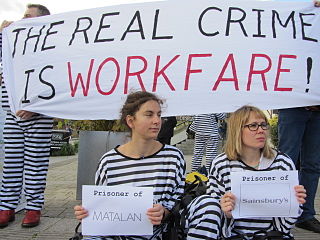The New Deal was a workfare programme introduced in the United Kingdom by the first New Labour government in 1998, initially funded by a one-off £5 billion windfall tax on privatised utility companies. The stated purpose was to reduce unemployment by providing training, subsidised employment and voluntary work to the unemployed. Spending on the New Deal was £1.3 billion in 2001.

The Department for Work and Pensions (DWP) is a department of His Majesty's Government responsible for welfare, pensions and child maintenance policy. As the UK's biggest public service department it administers the State Pension and a range of working age, disability and ill health benefits to around 20 million claimants and customers. It is the second largest governmental department in terms of employees, and the largest in terms of expenditure (£187bn).
Jobseeker's Allowance (JSA) is an unemployment benefit paid by the Government of the United Kingdom to people who are unemployed and actively seeking work. It is part of the social security benefits system and is intended to cover living expenses while the claimant is out of work.

Jobcentre Plus is a brand used by the Department for Work and Pensions in the United Kingdom.
Benefit fraud is a form of welfare fraud as found within the system of government benefits paid to individuals by the welfare state in the United Kingdom.
Employment and Support Allowance (ESA) is a United Kingdom welfare payment for adults younger than the State Pension age who are having difficulty finding work because of their long-term medical condition or a disability. It is a basic income-replacement benefit paid in lieu of wages. It is currently being phased out and replaced with Universal Credit for claimants on low incomes, although the contribution-based element remains available.
Incapacity Benefit was a British social security benefit that was paid to people facing extra barriers to work because of their long-term illness or their disability. It replaced Invalidity Benefit in 1995. The government began to phase out Incapacity Benefit in 2008 by making it unavailable to new claimants, and later moved almost all the remaining long-term recipients onto Employment and Support Allowance.
Employment Zones were areas within the UK designated as such to 'loosen restrictions' and requirements on government assistance in job acquisition. Those living in Employment Zones were able to get financial assistance to set up in business, improve their skills or even buy clothes for a job interview. The zones were managed by the Department for Work and Pensions.

A4e was a for-profit, welfare-to-work company based in the United Kingdom. The company began in Sheffield in 1991 with the objective to provide redundant steelworkers with the training required to obtain new jobs.
Universal Credit is a United Kingdom social security payment. It is means-tested and is replacing and combining six benefits for working-age households with a low income: income-related Employment and Support Allowance, income-based Jobseeker's Allowance, and Income Support; Child Tax Credit and Working Tax Credit; and Housing Benefit. An award of UC is made up of different elements, which become payable to the claimant if relevant criteria apply: a standard allowance for singles or couples, child elements and disabled child elements for children in the household, housing cost element, childcare costs element, as well as elements for being a carer or having an illness or disability and therefore having limited capability to work.

R v Secretary of State for Work and Pensions [2013] UKSC 68 is a United Kingdom constitutional law and labour law case that found the conduct of the Department for Work and Pensions "workfare" policy was unlawful. Caitlin Reilly, an unemployed geology graduate, and Jamieson Wilson, an unemployed driver, challenged the Jobcentre policy of making the unemployed work for private companies to get unemployment income. The outcome of the case affects over 3,000 claimants and entails around £130m unpaid benefits.

Workfare in the United Kingdom is a system of welfare regulations put into effect by UK governments at various times. Individuals subject to workfare must undertake work in return for their welfare benefit payments or risk losing them. Workfare policies are politically controversial. Supporters claim that such policies help people move off welfare and into employment whereas critics argue that they are analogous to slavery or indentured servitude and counterproductive in decreasing unemployment.
The Work Programme (WP) was a UK government welfare-to-work programme introduced in Great Britain in June 2011. It was the flagship welfare-to-work scheme of the 2010–2015 UK coalition government. Under the Work Programme the task of getting the long-term unemployed into work was outsourced to a range of public sector, private sector and third sector organisations. The scheme replaced a range of schemes which existed under previous New Labour governments including Employment Zones, New Deal, Flexible New Deal and the now abolished Future Jobs Fund scheme which aimed to tackle youth unemployment. Despite being the flagship welfare-to-work scheme of the Conservative-led coalition government, and then the incumbent Conservative government from May 2015, the DWP announced, in November 2015, that it was replacing the Work Programme and Work Choice with a new Work and Health Programme for the longer-term unemployed and those with health conditions. The DWP also announced that it would not be renewing Mandatory Work Activity and Help to Work which included Community Work Placements.

The Welfare Reform Act 2012 is an Act of Parliament in the United Kingdom which makes changes to the rules concerning a number of benefits offered within the British social security system. It was enacted by the Parliament of the United Kingdom on 8 March 2012.
Universal Jobmatch was a British website for finding job vacancies. The site was developed in a collaboration between the Department for Work and Pensions and Monster.
The Work Capability Assessment (WCA) is used by the British Government's Department for Work and Pensions (DWP) to decide whether and to what extent welfare benefit claimants are capable of doing work or work-related activities. The outcome of the assessment also determines whether claimants are entitled to Employment and Support Allowance (ESA), or more recently, additional elements of Universal Credit (UC).
Disability is an issue that directly affects a significant proportion of the population of the United Kingdom. Section6(1) of the Equality Act 2010 defines disability as:
"A person has a disability for the purposes of the Act if he or she has a physical or mental impairment and the impairment has a substantial and long-term adverse effect on his or her ability to carry out normal day-to-day activities."

I, Daniel Blake is a 2016 drama film written by Paul Laverty and directed by Ken Loach. It stars Dave Johns as Daniel Blake, a middle-aged man who is denied Employment and Support Allowance despite being declared unfit to work by his doctor. Hayley Squires co-stars as Katie, a struggling single mother whom Daniel befriends.

Iain Duncan Smith served as Secretary of State for Work and Pensions from 2010 to 2016. A member and previous leader of the Conservative Party, Duncan Smith was appointed to the cabinet by Prime Minister David Cameron following the 2010 general election and the formation of the coalition government between the Conservatives and the Liberal Democrats. He was reappointed after the Conservatives won a majority in the 2015 general election but resigned in March 2016 in opposition to disability benefit cuts.

The Minister of State for Work and Welfare is a mid-level position in the Department for Work and Pensions in the British government. It is held by Victoria Prentis.








